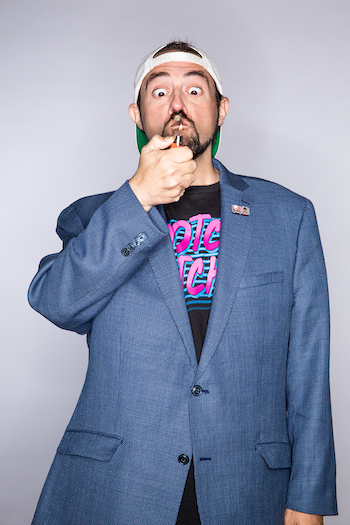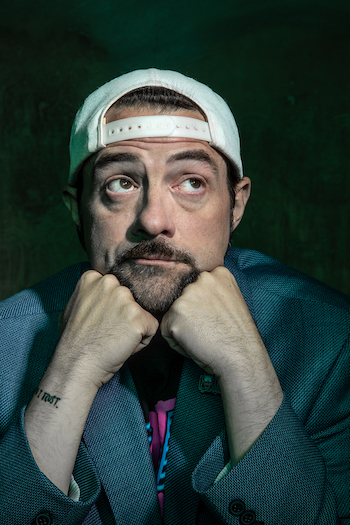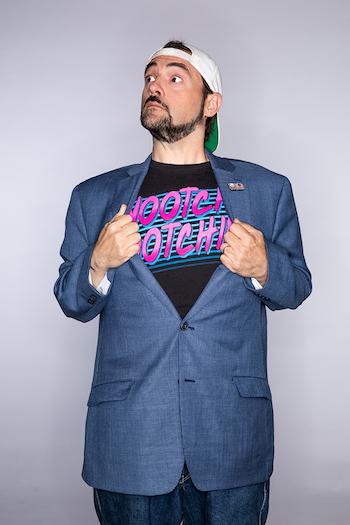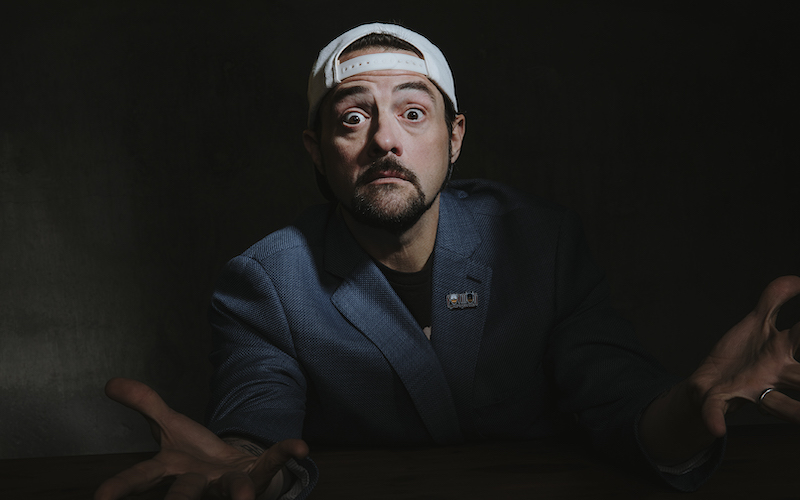If there were a Mount Rushmore of stoners, it’s likely that Kevin Smith’s face would be chiseled upon it. Starting with the 1994 film Clerks, which he wrote, directed, and acted in, Smith has charmed stoner comedy fans everywhere with his depiction of Silent Bob. Since then, Smith has built his very own film universe, the View Askewniverse, worked on a variety of TV shows, written comic books, and started his very own podcast. To what does Smith credit his expansive portfolio? Cannabis. But it isn’t just his portfolio. Smith may very well owe his life to cannabis after a doctor claimed that it was a joint that saved him when he had a heart attack. In this exclusive interview, Smith breaks down the modern stoner, his upcoming show Hollyweed, how he’s breaking into the cannabusiness, and how one joint saved his life.
 Cannabis & Tech Today: Since you worked on Clerks back in the 90s, how have you seen the stoner comedy genre evolve?
Cannabis & Tech Today: Since you worked on Clerks back in the 90s, how have you seen the stoner comedy genre evolve?
Kevin Smith: We were – I’m not going to say the first – but maybe one of the first generations removed from Cheech and Chong. So, we got to see what they did, and they kind of laid the stoner template down for like, “Hey, man, I’m stoned.” So, when Jay and Silent Bob stepped up to the plate; Jay doesn’t play it like a typical stoner, but he is definitely a little spacier than most, and then the other guy doesn’t talk at all.
But for me, they’re not indicative of true stoner culture. I wrote those characters back before I was a stoner, when I had smoked weed like a handful of times, and [Jason] Mewes never stayed a stoner for very long, so a lot of that was guess work and building on stereotypes that already existed. It wasn’t until years later that I became a stoner at age 38 that I finally watched the movies as a stoner and it was like, “Oh, I understand why people find them funny now. I kind of get it.”
But at the same time, now I’ve been a real stoner; I’ve been a wake-and-baker. I’m more productive in the last 10 years than I was in the first 10 years of my career. I just do way more because I made this little deal with myself when I started smoking weed on the regular. I said, “Look, you don’t want to be the stereotype. You don’t want to be lazy, wind up losing a lot of time watching TV and stuff like that. If you’re going to smoke weed, you have to be doing something productive. You can smoke as much weed as you want, but you always have to be moving forward and doing something productive.”
So at age 38, I went from just making movies to making movies, podcasts, TV shows, live shows, because I wanted to smoke weed. It was like the more I smoked, the more I had to show that I was being productive. So it wound up making me even more productive, man, and I got to do things that I never would’ve considered doing or dreamed that I could do…
I’m sure there are some people that smoke weed and watch TV, but in my world, man, those that smoke weed are productive, like people that are constantly doing, dreaming, making, and stuff like that. So if I were to create new characters, it would be closer to the characters that I created in Hollyweed. People that can hold their smoke incredibly well. You’d never even know they were stoners. That’s the thing. The modern stoner is hardly slow-witted. High-functioning, the modern stoner is…
C&T Today: Speaking of Hollyweed, where did that idea come from?
Kevin Smith: That came from a friend of mine, Kim Leadford, who was a producer on Yoga Hosers. She had a buddy, Pete, who runs a store that’s right on Melrose. She said, “Hey, Pete has this interesting story about coming from the east coast, and coming out here to do movies, but instead he wound up opening up a dispensary … He has a script and we want to try to turn it into something. Can you read it?” I read the script, and I was like, “Yeah, I mean, look it’s a good idea, but you’d have to really kind of go in this direction with it and whatnot.” She said, “Do you want to write it and direct it?” So I talked to Pete and he was like, “Go crazy.”
We found some money from the cannabis space. Weedmaps, they put in money, and that’s how we were able to shoot the pilot, but then the pilot didn’t go anywhere. No network wanted it or anything like that, so it just laid dormant for two years. Then I met these Rivet TV people, and they were like, “Hey, we’ve got this crowdfunding platform.” So we decided to dust it off, shoot a new ending, and put it out there. People responded really well to it.
It’s fun to do, man, and it gives you a chance to do stoner stories that aren’t the typical stoner stories, to show the stoners as they are today. I know one of the storylines that we’re going to do is Pete’s store, L.A. Confidential, like in real life, they kind of got screwed by legalization. They’ve got until about 2020, and then they have to close up shop even though they’ve been doing it for a decade, because suddenly they’re close to a school, which was never a problem before. So I said, “I’m going to borrow your real life problems and put them into this pilot, man.” Because you want to reflect real stories that are happening in the weed space, not just the fun of like, “Hey, we’re smoking weed, and it’s awesome!” But there’s a reality to it. There’s a business to it. There’s a culture that surrounds it, so I wanted to depict that accurately.
C&T Today: You mentioned earlier how, when you started smoking weed, it actually expanded your horizons. Could you talk a bit more about the specific role weed plays in your creative process?
Kevin Smith: It’s weird. I tell people all the time, weed will not give you a good idea. It’s not like suddenly you’ll smoke and be like, “Oh my god. I never would’ve thought of that before.” But what it does is lower your inhibitions, because we have a lot of things that hold us back from trying things we want to do, because we never think highly of ourselves. It’s so easy to think less of ourselves. It’s so easy to look at other people who are succeeding at what they’re trying to do, and go, “Well, that’s them, and they’re special and not me.”
That crazy self-doubt that is self-imposed, that doesn’t come from the outside world. The outside world is tough enough, man, but getting past yourself, that’s the biggest hurdle most times. So I light a joint and I’m like, “Pfft, why not me? Why them? How come I’m not special enough? Of course I can be special enough. Let’s do this. Let’s give it a shot.” You take that fear out of the equation; you remove that trepidation, the idea that it ain’t going to be you, it’s going to be somebody else. Look, that’s just a story you’re telling yourself. You don’t f***ing know. You don’t know the future, so if you’re going to tell a story to yourself, tell a positive one. Don’t tell one where it’s just like everything didn’t work out. Tell one where it’s just like, “Oh my god! Everything worked out. It was the best decision I ever made.”
 C&T Today: Earlier this year, you had a heart attack, and the doctor basically said that weed had saved your life. From then until now, did that experience change your view on weed at all?
C&T Today: Earlier this year, you had a heart attack, and the doctor basically said that weed had saved your life. From then until now, did that experience change your view on weed at all?
Kevin Smith: What it did was ratify my belief in weed in terms of like, I knew this stuff was doing something. I knew this was good for me. I knew it kept my tension down. I knew I’m not a stressed person by any stretch of the imagination, and that has everything to do with the fact that there’s always THC dancing through my system. After the heart attack, I was real afraid to bring it up to my general practitioner.
It was a week after the heart attack, and so I said, “Hey, I’m almost afraid to bring this up, because I don’t want to hear the answer.” I said, “But I smoked a lot the day of my heart attack; smoked a big, fat joint right before I got on stage. It pains me to know the answer, but is it possible weed had something to do with my heart attack?” The doctor was like, “No, quite the opposite actually.” She said, “You were calm the whole time, you told me.” I was like, “Yeah.” She’s going, “That’s because you were blazed … You know what happens when you have a heart attack? Somebody tells you you’re having a heart attack and it compounds the heart attack … But you, you were calm as a cucumber. You let them do what they needed to do.” She’s going, “It had everything to do with that joint. I believe that joint probably saved your life.” So I was like, “I’m going to put that s*** on a t-shirt.”
C&T Today: It’s amazing to think how your story might help battle a lot of those stigmas and show that cannabis can actually be a health benefit.
Kevin Smith: Absolute benefit. Now, I saw some doctors when I told that story came out on social media and they’re like, “He’s wrong. This is impossible, blah, blah, blah.” But all I know is that I lived. I know the truth that I lived, and there’s a lot that weed can do. When you get into the Rick Simpson oil end of things, it can shrink tumors for heaven sakes, so we know that it’s a powerful agent for change. That’s why working with the Chemesis cats, aside from just doing the recreational side with Jay and Silent Bob’s private reserve, they also do the medical side.
For me, I’m brand loyal to things that work like crazy for me. I like Apple computers, because I’ve written almost everything that I’ve done professionally on one, and they’re reliable, and I get them. I love hockey jerseys; it’s the fat guy’s muumuu for heaven sakes. I stand by that product, and it’s the same thing here, man. Weed is just something I can wave the flag for in a thousand different ways. I hope people look at me as a modern stoner and go, “Well, he’s doing a bunch of things, and he never seems dopey or out of it. He seems fairly lucid all the time.” And I’ve been baked for 10 years. So I stand out there as an example for some cats who could really need it…
 C&T Today: Could you dive a bit deeper into your collaboration with Chemesis and how that all came together?
C&T Today: Could you dive a bit deeper into your collaboration with Chemesis and how that all came together?
Kevin Smith: The Chemesis folks, God love them, literally cold emailed us to the Smodco email account. You know how cool that is? Normally somebody’s like, “Hey, I want to introduce you to somebody. There’s money involved and blah, blah, blah.” This was literally as if a fan was approaching us like, “Hey man, we got this weed company. We want to make weed with Jay and Silent Bob.” We met with them, loved the cut of their jib, and then they let us sample their product, and once I did that, I was like, “I will definitely be in business with you guys.”
So they brought over this guy, Adam, who’s just a creative genius. And just three weeks ago, we were in the living room of my house talking about the concept, what it could be, what it could look like and whatnot. Adam had this great idea. He’s like, “I want to do these little boxes that sit on a counter. They’re for the single roll joints, and we’ll do 12 or 15 in a case, in a little package, but when you open up the package, it folds into looking like the Quick Stop, or it looks like RSP Video.”
So instantly it’s tied in with our movies, and our legacies, and s*** we’ve been talking about for 25 years. So I was like, “Oh, that sounds cool, man. What a cool idea.” And God damn, if I didn’t go to MJBizCon and Adam showed me the actual things that we were just talking about three weeks ago. He built them, man. I shed a f***ing tear looking at these gorgeous, gorgeous single roll joints that are in these little glass containers that have me and Jay’s pictures plastered onto them. And it’s a reusable dube tube, so at the end of the day, when you’re done smoking the joint, you get to hold on to it, man. Because my thing was like, “Let’s make it collectible; let’s make it so that whoever’s smoking the joints, they collect all six.”
Because they all got different pictures on them and s***, like Burger King Star Wars glasses when I was a kid.
So I was on the floor at MJBiz showing it off to everybody. It’s nice to be on the manufacturing end and the marketing end. They’ll put it all together, and I’ll be the guy out there being like, “Step right up. Head to every weed legal state and you can pick up Jay and Silent Bob’s private reserve.”
C&T Today: So as you’ve moved from being a consumer to actually participating in the industry, is there anything that has surprised you so far?
Kevin Smith: I was flabbergasted by the breadth and scope of MJBizCon. I went to the CHAMP Show – I think it was almost a year ago – and that was impressive. It was like, “Oh, this is fun. I get it.” But then I went to this show, and it was massive. You should’ve seen the lines of people to get their badges to get on the floor. And the floor was as big if not bigger than the San Diego Comic-Con. This industry is massive…
I was up at one of Aurora Cannabis’ places up in Edmonton. They took me on a tour of their growth facility, 750,000 square feet, and it’s robotic and automated, so human hands only touch the trimming when it goes into the block, and then at the end when they pull it all together. The rest of the time whole tables are picked up by these giant robotic arms and shuffled to the next room. It is mind-bending what’s gone into it. I was like, “Somebody invented all this?” They’re like, “Yeah, man, the food industry.”
So watching what I’ve always known to be a business where somebody’s like, “50 bucks,” and they give me a little plastic bag, watching it become what it is today, when I walked into the MJBizCon, that was eye opening, to say the least, man. This industry isn’t going anywhere, man. It’s not going away. It’s going everywhere. It’s going up. But now that it’s gotten its foothold, forget it, man. This is the next cultural boom. This is the next industrial revolution.
All images courtesy of Robyn Von Swank.






